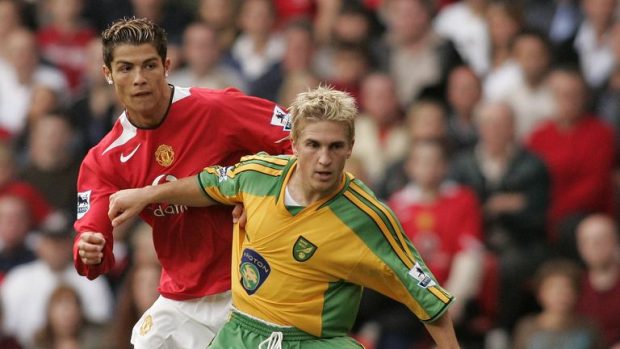PORTRUSH, Northern Ireland — This here was going to be about Scottie Scheffler trying to find his way. His way around the fifth Open Championship appearance of his career. His way around the links at Royal Portrush. His way, perhaps, to the three-quarter mile marker in golf’s career Grand Slam.
A golf story.
Advertisement
Except then Scheffler started talking, and the room started shifting, and his management started squirming. Who cares about pot bunkers when this happens? Out of nowhere, the honest-to-goodness best golfer in the world, perhaps the most unexplored mega-star in all professional sports, decided to let everyone inside.
“Is it great to be able to win tournaments and to accomplish the things I have in the game of golf?” Scheffler responded Tuesday morning, answering the final question of his pre-tournament press conference. “Yeah, it brings tears to my eyes just to think about it, because I’ve literally worked my entire life to be good at this sport.”
All well and good. But Scheffler kept pulling on the thread.
“To get to live out your dreams is very special, but at the end of the day, I’m not out here to inspire the next generation of golfers,” he continued, raising eyes away from notebooks and iPhones. “I’m not out here to inspire someone to be the best player in the world because what’s the point? This is not a fulfilling life. It’s fulfilling from the sense of accomplishment, but it’s not fulfilling from a sense of the deepest places of your heart.”
Maybe it’s the Irish air. Maybe it’s getting one year closer to 30. Whatever it is, Scheffler, an athlete often capable of saying a lot and revealing little, poured forth an answer that is likely to stay with him for a long time.
Now pens were moving.
“There’s a lot of people that make it to what they thought was going to fulfill them in life, and you get there, you get to No. 1 in the world, and they’re like, what’s the point?” Scheffler said. “I really do believe that. Because what is the point? Why do I want to win this tournament so bad? That’s something that I wrestle with on a daily basis.”
This version of Scheffler — Nihilist Scottie — has shown face before. Last summer, before the Paris Olympics, he was asked about the possible significance of winning a gold medal and carving a place in the pantheon of sports. He responded by shrugging and giving the least-Olympic answer imaginable: “I don’t focus much on legacy. I don’t look too far into the future. Ultimately, we’ll be forgotten.”
The moment made for some easy quips.
https://t.co/E9CVRQTXqn pic.twitter.com/EeDolyMoaz
— Brendan Quinn (@BFQuinn) August 1, 2024
Tuesday, though, went further.
And wit wasn’t necessary.
This Scheffler is worth understanding.
He kept going …
“We work so hard for such little moments,” Scheffler said. “I’m kind of sicko; I love putting in the work. I love getting to practice. I love getting to live out my dreams. But at the end of the day, sometimes I just don’t understand the point.”
Advertisement
The room laughed, both in agreement and amazement.
“I don’t know if I’m making any sense or not,” Scheffler said to longtime Associated Press golf reporter Doug Ferguson, the one who uncorked all this. “Am I not?”
He was, but the faces looking back at Scheffler couldn’t quite believe what they were hearing.
“(Golf) is one of the greatest joys of my life, but does it fill the deepest wants and desires of my heart?” Scheffler said, before answering a question that wasn’t asked. “Absolutely not.”
Scheffler’s stream of consciousness was worth hearing because it was free of intention. This wasn’t planned. His team didn’t craft this. Nor was it a self-serious, esoteric illumination. No. This was real and honest and open — as if Scheffler was trying to figure it out as he went along. At 29, he has now sat atop the world rankings for 148 of the last 173 weeks, won two Masters and emerged as one of the faces of the PGA Tour. Winning more than $130 million on the golf course doesn’t mean he doesn’t question his day-to-day existence just like the rest of us.
He kept going …
“Every day when I wake up early to go put in the work, my wife thanks me for going out and working so hard,” Scheffler said. “When I get home, I try and thank her every day for taking care of our son. I’m blessed to be able to come out here and play golf, but if my golf ever started affecting my home life or it ever affected the relationship I have with my wife or my son, that’s going to be the last day that I play out here for a living.
“This is not the be-all, end-all. This is not the most important thing in my life. That’s why I wrestle with, why is this so important to me?”

Scheffler, right, is joined by his wife, Meredith, and son, Bennett, after winning the PGA Championship in May. (Andrew Redington / Getty Images)
The questions Scheffler is asking himself are likely different from what many would assume. A certain staid version of Scottie Scheffler was fairly cemented long ago. The guy who aw-shucks his way to win after win. The wholesome family man. The devout Christian.
Not exactly Nietzsche.
But Scheffler’s ability to avoid tying his identity to being the world’s best golfer is actually a helluva explanation for why he’s the world’s best golfer.
Advertisement
Raymond Prior, a performance psychologist who’s worked with several major champions, explained in a conversation with The Athletic this past spring the difference between those who care about the big picture and those who question what that picture reveals.
“What the research tells us is the more you’re trying to smother your inner experience, the more f—ed you are, pardon my language,” Prior said. “I can have whatever thoughts and feelings without necessarily needing to do anything with them. I can shift my focus to, what if I just did the thing in front of me, which is technically the only thing that I actually have to do. I don’t need to manage other people’s opinions. I don’t need to ensure my legacy. I don’t need to save myself from my past. The only thing I need to do is get this golf ball started and see how it plays out.”
Going further, the emptiness Scheffler feels between who he is and the game he plays does, in fact, have a place in his faith. Take a look at Ecclesiastes. Or just leave it to an Irish poet to sum things up.
As W.B. Yeats put it: “Where there is nothing, there is God.”
Scheffler wrapped up his Tuesday press conference by making it clear he maintains “a deep sense of gratitude and appreciation” for his accomplishments and his place in the game. At the same time, one more time, he wanted you to understand — life is larger than a golf ball.
“I love being able to come out here and compete,” he said, “but at the end of the day, it’s not what satisfies me, if that makes sense.”
It does.
(Top photo: Warren Little / Getty Images)
This news was originally published on this post .










Be the first to leave a comment